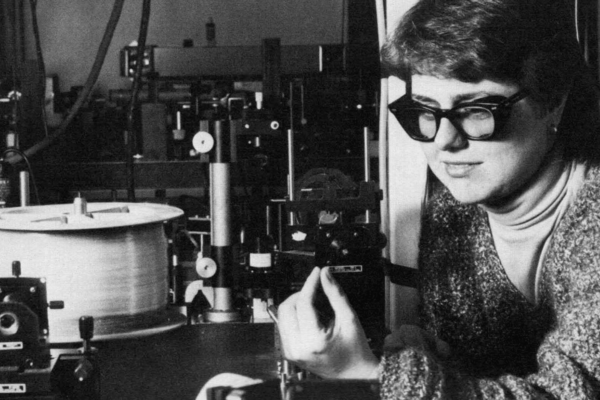
ChemEd Conference at 40
Waterloo creates right formula for inspiring high-school chemistry teachers from across North America.

Waterloo creates right formula for inspiring high-school chemistry teachers from across North America.
By Christian Aagaard Communications and Public Affairs
Ice, bed sheets, quilted patches -- who knew the periodic table of elements could come in so many shapes and sizes?
Yet, over 40 years, chemistry’s essential reference has been cleverly rebuilt again and again by high-school teachers attending the ChemEd conference, which returns to the University of Waterloo July 28-Aug. 1.
Waterloo was its first host in 1973.
"You get out there (ChemEd) and there is always something new that you haven't thought of," says Sharon Geyer, a chemistry teacher at Pomfret School in Connecticut. "One year, I took a whole-day class on pyrotechnics. The morning was lecture-based. In the afternoon we went into the lab and made some fireworks. That was really cool."
A biennial conference that moves around North America, ChemEd was born out of frustration in the early 1970s. St. Catharines-area teacher Leonard Sibley didn't think the academic conferences of the day offered much to improve high-school chemistry.
Filling a gap
He counted Reg Friesen of Waterloo's Department of Chemistry among his allies. Through mail and meetings, a conference developed around the lively teaching of chemistry to students too young for university.
Lew Brubacher, a professor emeritus at Waterloo, attended all but a few ChemEd conferences, and helped plan many of them.
He saw laboratory teaching tools shift from slide rules to portable computers. ChemEd, he says, puts the focus back on people.
"The teacher in the classroom, I think, is still the main way many subjects are taught, including chemistry," he says.
The inaugural ChemEd in August 1973 attracted 325. This year's event is expected to draw at least 425, not counting about 75 volunteers.
Attendees can choose from 200 sessions and events. Geyer is among 160 presenters. She plans to demonstrate a lab unit she has been working on for five years.
Sharing skills and ideas is a key element of ChemEd, says John Eix, a Waterloo grad and now-retired chemistry teacher. For Pat Vance, who chaired ChemEd 2011 in Kalamazoo, Mich., the conference provided early-career collaboration when it wasn’t readily available.
"I was the only chem teacher at my school," Vance says in an email. "So Chem Ed offered me a chance to find out what was new in the way of equipment, labs, teaching theories and methods, and knowledge.
"I made new friends every time, and have distinct memories of each conference because each was unique."

Read more
Here are the people and events behind some of this year’s most compelling Waterloo stories

Read more
Waterloo researchers have developed a new quantum computing approach that brings science closer to simulating the early universe

Read more
Celebrating Dr. Donna Strickland's chirped pulse amplification breakthrough that has reshaped science, technology, and everyday life over the last 40 years
The University of Waterloo acknowledges that much of our work takes place on the traditional territory of the Neutral, Anishinaabeg, and Haudenosaunee peoples. Our main campus is situated on the Haldimand Tract, the land granted to the Six Nations that includes six miles on each side of the Grand River. Our active work toward reconciliation takes place across our campuses through research, learning, teaching, and community building, and is co-ordinated within the Office of Indigenous Relations.